2018 Annual Report
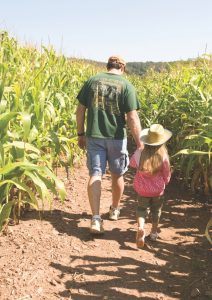 University of Maine Cooperative Extension Waldo County
University of Maine Cooperative Extension Waldo County
Putting university research to work in homes, businesses, farms and communities for over 100 years.
Our annual report features highlights of recent accomplishments and the difference we make in the lives of Maine citizens and their communities.
Download a print-friendly copy of the 2018 Annual Report (PDF).
Office of the Interim Director
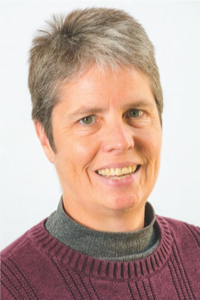
Welcome to the University of Maine Cooperative Extension! We are located across the state in 16 county offices, research farms, 4-H camps, and online. We are the largest outreach component of the University of Maine and reach more Maine people than any other entity within the seven campus University of Maine System. Our work is focused on two areas of excellence. UMaine Cooperative Extension conducts the state’s most successful out-of-school youth education program through 4-H, empowering young people to reach their full potential. Extension also helps support, sustain, and grow the food-based economy across the entire state of Maine. We are the only entity in our state that touches every aspect of the Maine Food System, where policy, research, production, processing, commerce, nutrition, and food security and safety are integral and interrelated.
UMaine Cooperative Extension is determined to make a positive difference in our areas of excellence for the citizens of Maine. Explore our website, visit a county office, and contact our enthusiastic workforce.
— Lisa Phelps, Interim Director
Waldo County Extension Association
Officers:
- President: Anna McGalliard
- Vice President: Eric Rector
- Secretary: Anne Devin
- Treasurer: Samara Santiago
Members:
- Atkan Askin
- Ken Clements
- Theresa Gaffney
- Katy Green
- Darcy Johnston
- Jodie Martin
- David McDaniel
- Matthew McKillop
- Sadee Mehuren
- Jacki Perkins
- Anne Rothrock
Waldo County Staff
- Sónia Daniel O. Antunes, administrative specialist
- Anne Devin, farmer veteran maine agrability coordinator
- Alicia Greenlaw, parent education professional
- Rick Kersbergen, Extension educator, sustainable dairy & forage systems
- Viña Lindley, food systems/youth development professional
- Wesley Neff, parent education professional
- Billiejo Pendleton, administrative specialist
- Diane Russell, parent education professional
- Joyce Weaver, 4-H program aide
Financial
University of Maine Cooperative Extension Support for Waldo County
Without statewide support, UMaine Extension would not be present in your county. Funds for projects are provided through the University of Maine, Federal Formula Funds, grants, contracts, and fees. Dollars from other sources support salaries and benefits for Extension specialists, county educators, Extension administration, computer equipment and networking, publications, postage, telephone, and travel.
| Waldo County | CY2018 |
| Local Salaries and Benefits | $574,700 |
| Prorated Support from UMaine* | $432,669 |
| Computer Equipment and Networking | $1,533 |
| Statewide Animal Diagnostic Lab | $12,137 |
| Marketing, Publications, Video | $939 |
| Local Programming Supplies & Expenses | $12,709 |
| Postage | $1,302 |
| Telephone | $444 |
| Travel | $34,874 |
| TOTAL | $1,071,307 |
* Prorated support from UMaine reflects travel, postage, telephone, computer equipment & networking, salaries & benefits for administrative and state-wide staff.
Statewide Extension Funding
As a unique partnership among federal, state and county governments, UMaine Extension uses funding from Maine counties and the University to match and leverage support from the United States Department of Agriculture, other federal grantors, state agencies and private foundations. Each county UMaine Extension office is also part of a statewide organization and the national Extension system.
This pie graph illustrates the financial resources for programs offered, supported and managed out of the Waldo county office. Each year, Waldo county tax dollars support the UMaine extension with physical office space, support staff salaries, office supplies, equipment and some programming expenses.
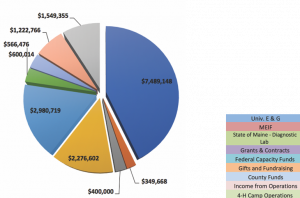
County Highlights – Maine Food System
FoodCorps
A national program, FoodCorps has service members in 18 states and hundreds of schools across the country who teach kids about the importance of healthy food, engage students with hands-on nutrition and garden education, and increase local food purchasing in school cafeterias while promoting school lunch. 2018 was the final year that supervision of Maine’s statewide FoodCorps program was based out of the Waldo County Extension office, under the direction of Food Systems & 4-H Professional Viña Lindley.
Of the twelve service members located in the state of Maine, one was based in Waldo County in 2018 – serving at Tanglewood 4-H Camp & Learning Center, reaching students at Edna Drinkwater in Northport. This was a change from the previous year when two service members were based in Waldo County. 2017 was the last year of FoodCorps service in RSU3 and after a major grassroots effort on behalf of school staff, students and families, a new position for the district was approved and funded for the 2018 school year. The new position, which is a full-time teaching position, will support garden education at Walker, Troy, Monroe, Brooks and Mt. View elementary schools.
In 2018, service members spent a minimum of 20,400 hours in schools across the state where they taught lessons, tended school gardens and helped promote healthy eating. Service members helped to grow 26 school gardens, they engaged over 170 volunteers who contributed a total of 564 volunteer hours and they delivered 278 taste tests or other promotions in cafeterias across Maine. FoodCorps service members are helping grow a healthier generation of students in Waldo county and beyond.
2018 Farm to Institution Summit
The 2018 Maine Farm to Institution Summit was organized by Maine Farm to Institution (MEFTI) and the Maine Farm to School Network (MF2SN), of which Viña Lindley/Cooperative Extension serves as a Maine Supporting Partner. The conference built on the previous success of the Maine Farm to School conferences.
The Summit was a gathering of farmers and food producers, food service operators, advocates, educators, administrators, and others dedicated to cultivating the power of institutions to develop an equitable and resilient Maine food system.
The Maine Farm to Institution Summit, was held at the Hutchinson Center in Belfast, and was designed to inspire and energize the network through sharing best practices and innovative strategies; enhancing network capacity through skill building; and strengthening collective impact by engaging food producers, educators, decision-makers, leaders, and policymakers in shared problem-solving. Over 220 people registered for the event and feedback about their experience was overwhelmingly positive, over 75% of participants said that their experience was excellent or very good. The summit was an overall success and the MEFTI and MF2SN network looks forward to hosting another event on a bi-annual basis.
Food Preservation & Food Safety Programing
Waldo County Cooperative Extension offers programming in the area of safe food handling and preservation for the public which includes handling individual client calls and emails as well as in-person workshops, demos and events.
One of the trainings we offer, Cooking for Crowds, is geared toward volunteers who serve food to the public. This training meets the requirements for organizations who partner with the Good Shepard Food Bank and serve meals to the public. In 2018, we hosted 4 Cooking for Crowds workshops which were held at the Belfast Soup Kitchen, Searsport alternative high school and at the County office. Over 30 people were trained in safe food handling best practices. Workshops were also offered on safe food preservation techniques including water bath and pressure canning in the mid coast region in partnership with adult education programs and the YMCA. In addition to workshops, we reached over 100 attendees at the Waldo county Emergency Preparedness Fair in September with resources and information on food safety and preservation. We also offer free pressure dial gauge testing for clients who want to check the accuracy of their gauge.
Northeast Farm to School Institute
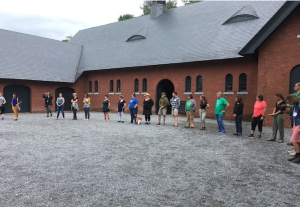 The Northeast Farm to School Institute is a unique year-long professional learning opportunity for twelve school teams from New England and New York. The Institute kicks off with a 3-day Summer Retreat held at Shelburne Farms in Shelburne, VT in late June where teams create an action plan for the year to expand farm to school activities in their school or district. Each team is paired with a coach who helps keep the team on target with meeting their goals once the retreat is over. Participation in the institute is competitive and generally only 1 team is selected to represent Maine per year. In 2018 Captain Albert Steven’s School was selected to attend and was paired with Viña Lindley as their coach. The team includes the principal, a school nurse, a 3rd grade teacher, the cafeteria manager and a community volunteer. Over the course of the school year the CASS team has been working to expand their school garden, local foods purchasing and overall awareness within the community about their farm to school program.
The Northeast Farm to School Institute is a unique year-long professional learning opportunity for twelve school teams from New England and New York. The Institute kicks off with a 3-day Summer Retreat held at Shelburne Farms in Shelburne, VT in late June where teams create an action plan for the year to expand farm to school activities in their school or district. Each team is paired with a coach who helps keep the team on target with meeting their goals once the retreat is over. Participation in the institute is competitive and generally only 1 team is selected to represent Maine per year. In 2018 Captain Albert Steven’s School was selected to attend and was paired with Viña Lindley as their coach. The team includes the principal, a school nurse, a 3rd grade teacher, the cafeteria manager and a community volunteer. Over the course of the school year the CASS team has been working to expand their school garden, local foods purchasing and overall awareness within the community about their farm to school program.
County Highlights – 4-H Youth Development
4-H is the positive youth development program of the University of Maine Cooperative Extension. In 4-H, youth partner with caring adults to explore areas of interest where youth acquire knowledge and skills that will build youth’s confidence to respond as engaged civic leaders now in the future. 4-H provides the flexibility for volunteers to plan activities and projects for youth throughout the county.
There are several ways youth ages 5-18 can participate in 4-H: in school, afterschool programs, traditional clubs and camps. In 2018, Waldo County had 39 youth enrolled in 4-H clubs with 28 volunteers. Through our UMaine Extension and 4-H programs, over 250 students were connected to a positive youth development learning experience in 2018.
Citizenship Washington Focus (CWF)
Every summer, high school students from across the country travel to Washington, D.C. to participate in Citizenship Washington Focus, CWF is an opportunity for 4-H’ers to learn how to be citizen leaders and make a difference in their communities.
The Waldo County 4-H Leaders Association Live 4-H Auction fundraiser makes 4-H Programs, like CWF, possible for county youth. As a result of this support, 14 county youth have participated in 4-H educational trips from 2012-2018. CWF educational trip is valued at $1300 for each Maine 4-H Delegate.
Special thanks go out to our county businesses and individuals who donated over 100 items. We would like to thank our 4-H youth and volunteers who helped with the auction and to community members who came and brought a friend to support our auction fundraiser while having fun bidding on our auction items. Our 4-H youth and volunteers extend a heartfelt thanks to Jodie Martin, our county 4-H Leader’s Association Treasurer, for organizing and running a successful auction.
2018 4-H Recognition Family Fun Day!
On Saturday, November 10th, over 40 people gathered to celebrate all the learning and hard work our Waldo County 4-H members experienced over the 4-H year. Kids and adults enjoyed being social and physically active while bowling at AllPlay Family Entertainment Center in Belfast.
After bowling, 4-H youth and volunteers were recognized for being members in good standing. Annually, each 4-H’er is encouraged to submit one completed project record for county recognition. 4-H youth were recognized with 4-H certificates and project pins. 4-H Volunteers were presented 4-H magnets and bookmarks as a small token of volunteer appreciation from our county 4-H members.
Poultry SPecial INterest [SPIN] Workshop
Ten 4-H youth from across the State of Maine became quickly engaged in a Poultry Demonstration Workshop, facilitated by Linda Blackman and her husband, Dick, from the Central Maine Bird Fancier Association.
In 4-H, youth are encouraged to explore topics of interests through a hands-on, experiential learning process. Each youth selected a bird to hold as they talked through their bird characteristic observations. Youth continued researching their birds using the Bantam Standards and American Poultry Standards Guides. Youth learned that although some birds were similar, the standards are clear for pure breeds. Birds that are entered in an open show as a pure breed must meet these standards. If your bird does not meet these standards, your bird would be is qualified. Each fair has rules and regulations and it is important to understand each fair’s expectations as you prepare to show or participate in showmanship.
4-H’ers were asked “why do you want to show your chickens in a poultry show?”
“To win a prize” Jack
“I just like to talk with other people who know more about birds.” Riley
“I like chickens and want to show them.” Isabelle
Throughout the workshop, 4-H’ers took turns how to place a bird in the cage [the head has to go in first], how to place their fingers between the bird’s legs and pass the bird to another person. Preparing to show and showmanship all takes time. If birds are not handle properly, you can break their feathers even toes. Birds must be acclimated to their cages and a judge can certainly tell if the exhibitor has worked with their bird or not. It was great to see how all the youth were supporting each other as they engaged in our SPIN Workshop experience.
![SPecial INterest [SPIN] experience participants](https://extension.umaine.edu/waldo/wp-content/uploads/sites/34/2019/10/SPIN-300x151.png) SPecial INterest [SPIN] experiences make it possible for busy caring adults to share your time and talents with youth in your community. SPIN experiences provide hands-on introductory programs where youth can EXPLORE many of their interests.
SPecial INterest [SPIN] experiences make it possible for busy caring adults to share your time and talents with youth in your community. SPIN experiences provide hands-on introductory programs where youth can EXPLORE many of their interests.
UMaine Extension Waldo County 4-H Program is currently seeking caring adults to teach Gardening, Photography, Sewing, Shooting Sports: Archery and more.
Meet Some of Our Inspiring Waldo County 4-H Youth
The following 2018 recognition and awards were presented to 4-H members.
Independent 4-H Members
Participation Ribbon: Zia Heald
Poultry and Sewing Pin: Zoe Heald
Little Beavers 4-H Club
Civic Engagement Certificates went to Lydia Schofield for Community Service and Leadership, Ruben Schofield for Community Service and Mentor, Shaynen Schofield for Community Service, Mackensie Schofield for Community Service and Mentor and Kelsey Stevenson for Community Service and Mentor.
Born to Ride 4-H Club
Citizenship Pins went to Ryan Ingraham and Abbie Kneeland for CWF trip and Honorary Paige at the State House.
Mentor Pins went to Ryan Ingraham, Abbie Kneeland, Lily Parsons, Emily Gould and Emily Clark.
Horse Pins went to Ryan, Abbie, Lily P, Emily Gould., Emily Clark. Shoshanna Dallal, Hannah Ferreira, Samantha Bissell, Emma Birch, Alexa Coffin.
Civic Engagement Community Service certificates went to Ryan, Abbie, Lily, Emily G. Emily C., Shoshanna, Hannah, Samantha, Theresa Kinney and Alexa Coffin for community service for Cancer patient, Foster Kids, Fire Dept. Oxygen masks, Mt. View Enrichment program and community clean up in Knox.
Judging Pins went to Ryan, Abbie, Lily, Emily G. Emily C. Shoshanna, Hannah Ferreira, Samantha, Alexa and Emma.
Health Pins (CPR and First Aid) Pins for Ryan, Abbie, Lily, Emily G. Emily C. Shoshanna, Hannah, Samantha and Emma for taking the CPR and First Responder.
Teen Leadership went to Emily Clark for patiently leading and guiding all her fellow teammates for the last two year and exhibiting how a positive 4-H member and leader should be.
Youth Leadership went to Lily Parsons for how she represents being a positive, thoughtful 4-H member who takes on the responsibility of leadership in all functions of her club and is willing and successful in her youth team functions (i.e. Bangor Quiz Bowl placing first in youth).
Hippology to Ryan Ingraham – she is a member of the Maine Hippology Quiz Bowl Team.
The GameLoft Afterschool Coming of Age History 4-H Club
Civic engagement Citizenship Pin went to Marcus Vaillancourt.
New Belfast Horse 4-H Club
Welcome to 4-H: Flag Table Set was presented to 4-H Leader, Trish Crowell.
Community Recognition
Friend of 4-H Award went to Debbie Heath for Facilitating an Introductory to First Aid and CPR Session at the 2018 Maine 4-H Days – 30 youth participated in Deb’s sessions.
4-H Volunteer Leadership Award went to Jodie Martin, In grateful appreciation for outstanding service as our Waldo County 4-H Auction Chairperson.
Meet Our Clubs & Partner Programs
Born to Ride 4-H Club
Born to Ride is a 4-H Youth Group for all equine enthusiasts from ages 9 to 18. The program is a fun, hands-on learning experience that develops life skills, as well as teaches knowledge of horsemanship and responsible, ethical equine use, care and management. Youth have the opportunity to do activities and enrichment workshops like judging, exhibits, community service and 4-H Horse Shows. Youth who participate in these programs develop skills that include leadership, sportsmanship, teamwork, a positive attitude, and a sense of self-worth.
This is the second year as a 4-H equine club. They have 16 members. During February of 2018 they partnered with Unity College students and did a chili/chowder cookoff to benefit foster kids. The club is lucky enough to have their own arena and hosts many horse game shows, Equitation shows and host the NBHA and Regional Barrel Racers. Throughout the year they have received their CPR and First Aid Certificates, mentored at two horse camps, attended 4-H Days at Windsor Fair Grounds, attended 8 horse clinics and 12 horse shows.
Little Beaver’s 4-H Club
The Little Beavers 4-H club attended Fryeburg Fair to show and Eastern States Expo. They all had a great time and participated in many activities. Mackensie and Lydia were on the clipping team. Mackensie was on the quiz bowl team and won so traveled on to Louisville, KY in November to compete nationally. Mackensie was on the judging team. They participated in the state quiz bowl and state judging in the spring. Mackensie was second high scorer for oral reasons in judging and made the judging team. They will put on a mini clinic next month to help members with clipping and showmanship and will have other counties coming to this.
They are working hard to finish their Veterans signboard before the Bicentennial for the Town of Knox. They’ve been working on this for several years and started with the memorial in 2007 and have gradually completed the steps. They care for the cemeteries in the Town of Knox cleaning and putting out flags. They also traveled to the Maine State Veterans Cemetery Memorial weekend and helped put flags on it.
The club had a member that won a trip to National Congress in Georgia and National Conference in Washington, D.C. last year besides the trip to Kentucky. They participated in several state fairs. There is a great deal of teaching and learning amongst the kids as they help each other and answer many questions amongst each other. It is a great learning experience.
The Little Beavers 4-H Club began in 1974. We are a 5th generation 4-H family with a big focus being involved in community and STEM projects like animal science (dairy cattle and market animals) and the annual National Youth Science Day Challenge.
4-H Independent Learning can lead to SPIN Experiences
4-H provides flexibility for youth to participate in programs that meet the interests of kids and teens. 4-H youth partner with a caring adult and set goals that make learning meaningful and fun. The Maine 4-H Program recognizes independent 4-H member(s) as a form of program membership and delivery.
Zoe and Zia are on their second year in 4-H as independent members. 4-H fits nicely into their Homeschool requirements while meeting new friends through Special Interest (SPIN) experiences.
2018 was a little slow going as they learned the terms, acronyms and expectations of 4-H for a junior member and Clover Bud. During spring break 2018 they greatly enjoyed their first SPIN club making lap quilts and 4-H patterned tote bags. The girls were part of a multi county poultry event where they were taught how to handle and show their birds at Union Fair. The girls did not feel they had a bird ready that was show quality for fair time 2018 but are working eagerly toward showing chickens and ducks this summer.
The family participated in Maine 4-H days at Windsor Fair Ground where the girls did their first camp out with their dad. Zoe loved the archery, first aid, and other events. Zia greatly loved the Cover Bud tea party and was a radiant Tiana. The air bag rockets were a lot more fun after her dad picked her up and dropped her onto her bag which sent her rocket soaring just as high as the “big” kids rockets. They proudly show off the “sit upons” they made to any visitor who stops by. Walking the goats was greatly enjoyed.
The county 4-H Recognition Day, at the AllPlay Family Entertainment Center, was a special event for both of the girls as their dad bowled with them even though he was on crutches. Zoe earned for an achievement pin in sewing and poultry. Zia got her Clover Bud certificate and Ribbon.
The group has continued to do individual projects and SPIN experiences with most of the same children and additional families into the current 4-H year. They are expecting to form a club by September. What started out as two youth with 4-H alumnae volunteer, Grandma Nancy Heald, has blossomed to four families and about 20 children with our county 4-H program staff’s help connecting them all together.
Agriculture and Natural Resources – Research & Education
Cover crop & no-till corn silage production
Rick Kersbergen continued his research and education efforts working on increasing the acreage of no-till corn and the use of cover crops with dairy farmers throughout the state. Research results (including those from farmers in Waldo County) indicate that adoption of this growing technique saves over $50/acre in time and money, by reducing costs and improving profitability. Cover crop and no-till adoption is a proven way to reduce environmental impacts from farm operations. In 2018, additional research began on alternative manure handling on no-till corn farm fields. Some of the research is done with cooperating producers as well as in replicated trials at the University of Maine Experiment Station. It is now a common sight to see green fields in the fall and spring where corn was grown during the summer. This benefits not only the farmer, but reduces erosion and prevents water quality issues in lakes and streams.
Dairy Research
Organic dairy farmers are now challenged with lower milk prices, as are conventional dairy farmers. Extension works to help producers by conducting research on ways to cut expenses and manage high feed bills. The continued depression in milk prices has made it difficult for many dairy farmers to survive. Work also continues through organizations such as the Maine Organic Milk Producers (MOMP) to facilitate educational programs and marketing efforts.
Corn Silage Variety Trials
Now in the 15th year, the state corn silage variety trials are managed by Rick Kersbergen and Caragh Fitzgerald. This research represents some of the best corn hybrids available to growers in Maine. The data resulting from this project is critical for producers who now spend significant amounts of operating capital each spring on corn seed. Making informed decisions about hybrids that perform well in Maine conditions is crucial to profitability. Differences found through simple hybrid selection can make a huge difference in the amount of purchased grain dairy farmers need to buy and greatly influences milk production on the farm.
In 2018, additional plots were planted to evaluate how corn varieties interact with interseeded cover crops. A trial was funded that allowed for experiments in Knox and in Burnham. A video about cover crops and no-till corn was extensively used. Additionally, a training program was developed to teach other agricultural professionals about no-till cropping systems and cover crop establishment. extension.umaine.edu/agriculture/soil-health/no-till-and-reduced-tillage/
Tractor and Farm Safety Courses
Since agriculture is one of the most hazardous occupations, UMaine Extension in Waldo County offers a tractor and farm safety class for youth and adults each year in cooperation with Ingraham Equipment in Knox. The class is designed for youth 14-16 to earn certification so as to be able to work on a farm and use tractors as part of their employment. In 2018, Fourteen students graduated from the class. In addition, safety classes are organized and presented to MOFGA apprentices, employees of Johnny’s Selected Seeds and students at Kennebec Valley Community College. In 2018, Kersbergen continued to receive funds from Bassett Hospital in NY to expand farm safety education programs. Displays and presentations were made at Maine Farm Days and several other events in 2018 including the Agricultural Trades Show in Augusta.
Ag Education Programs and Partnerships
Extension in Waldo County partners with agencies such as the Maine Organic Farmers and Gardeners Association (MOFGA) and producer groups such as the Maine Grass Farmers Network (MGFN) to coordinate educational programs such as pasture walks, and the Farmer-to-Farmer conference. Extension also hosts the website for MGFN www.umaine.edu/livestock/mgfn and organizes their Annual Grazing Conference held in Fairfield that draws over 100 participants.
Rick works closely with the Maine Organic Milk Producers (MOMP) and helps provide educational programs and a unique equipment-sharing program. Organic dairy farms now make up over 30% of all dairy farms in Maine.
Small farmers continue to call the office for assistance. Some of these are to explore new opportunities in agriculture and others are to try and solve problems. Extension helps to run the Beginning Farmers Resource Network (BFRN) http://www.umaine.edu/beginning-farmer-resource-network that helps new and developing farm operations to find educational resources throughout the state. New livestock as well as vegetable operations are starting up in Waldo County as a result of a renewed interest in local foods and healthy lifestyles.
UMaine Extension in Waldo County hosts the Maine Hay Directory, which serves as a resource for farmers marketing hay as well as those animal owners in need of feed www.extension.umaine.edu/ Waldo/hay.
State and National Representation
Rick Kersbergen serves on several state organizations and holds leadership roles. He has served on the State Nutrient Management Review Board since 2000. Rick is a cooperating member in the Department of Animal & Veterinary Science at UMaine. In addition, he is on the agriculture and forestry technical committee for Maine Technology Institute.
State Specialists working with Waldo County Agriculture
Agricultural programing in Waldo County is assisted by state specialists who provide valuable assistance to farms and natural resource based. One example of this includes Gary Anderson, State Dairy Specialist who has worked with numerous dairy farms solving milk quality issues and helping to do financial planning and farm transitions.
Dairy Grazing Apprenticeship Program
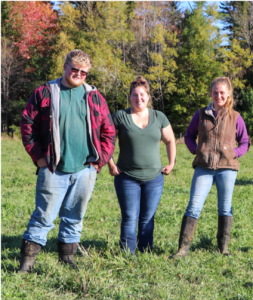 In 2018, Rick Kersbergen continued his role as the Education Coordinator for the Dairy Grazing Apprenticeship Program www.dga-national.org in Maine and Vermont. This is a federally approved Department of Labor (DOL) Apprentice program that pairs “Master” farmers with apprentices for a 24-month apprenticeship. Rick coordinates educational opportunities for apprentices and manages the program for Masters in Maine and in Vermont.
In 2018, Rick Kersbergen continued his role as the Education Coordinator for the Dairy Grazing Apprenticeship Program www.dga-national.org in Maine and Vermont. This is a federally approved Department of Labor (DOL) Apprentice program that pairs “Master” farmers with apprentices for a 24-month apprenticeship. Rick coordinates educational opportunities for apprentices and manages the program for Masters in Maine and in Vermont.
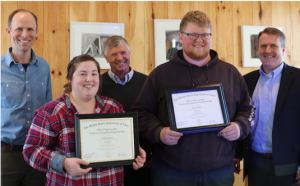
Currently there are 7 Master farmers in Maine, with 6 apprentices. The program has graduated 4 students who are now “journeypersons” and work in the dairy industry in Maine. This project is in cooperation with Wolfe’s Neck Center for Agriculture and the Environment in Freeport and Stonyfield Yogurt in New Hampshire.
County Highlights – Community and Economic Development
Maine Families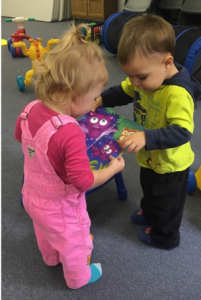
Maine Families is a home visiting program for expecting or new parents with a focus on family strengths. The Maine Families Home Visiting Program is part Maine’s strategy to ensure healthy futures for our children.
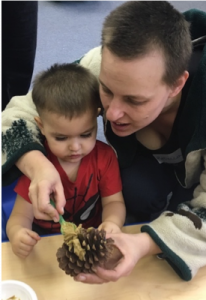 Family Visiting professionals provide individualized parent education and support throughout Waldo County to expectant parents and parents of babies and toddlers to support safe home environments, promote healthy growth and development, and provide key connections for families to available services in their communities. The program is tailored to meet the needs of each family.
Family Visiting professionals provide individualized parent education and support throughout Waldo County to expectant parents and parents of babies and toddlers to support safe home environments, promote healthy growth and development, and provide key connections for families to available services in their communities. The program is tailored to meet the needs of each family.
 Maine Families believes that parents are their children’s first and most important teachers. Parent/child interaction and experiences in the early years determine how the baby’s brain develops and sets the stage for the child’s future.
Maine Families believes that parents are their children’s first and most important teachers. Parent/child interaction and experiences in the early years determine how the baby’s brain develops and sets the stage for the child’s future.
In 2018 Maine Families in Waldo County also offered twelve playgroups for enrolled families. These groups are offered at the UMaine Cooperative Extension building in Waldo. Children attend with their families and sometimes friends. It is chance to get out, meet other families with children and learn new games and activities to play at home. Each group includes free play, a healthy snack, information related to nutrition, social development, motor skill development, brain development and the value of learning through play.
In 2018, 69 families
received 781 home visits
Families receive access to the latest research-based information about
- Healthy prenatal practices
- Feeding and nutrition
- Safety and health
- Connections to community resources
- Child growth and ways to encourage healthy development
extension.umaine.edu/parenting/maine-families-waldo/
Statewide Highlights – Maine Food System
University of Maine Veterinary Diagnostic Lab
The University of Maine Veterinary Diagnostic Lab (VDL) provides services to veterinarians, livestock producers, and animal owners of the state. The lab performs a variety of diagnostic services, including necropsy, microbiology, virology, pathology, and special research support. It offers diagnostic support to veterinary clinicians, and assists in finding solutions for agricultural producers using UMaine Extension resources. In 2018 UMAHL tested over 6,000 samples, the great majority of which were from farm animals. Our salmonella and mastitis labs test poultry farm environmental swabs and milk, allowing farms of all sizes to operate with more assurance of healthy animals and healthy products. The new Diagnostic and Research Laboratory that opened in June 2018 has expanded the VDL’s services, outreach, and positive impact on Maine’s farms
Supporting Maine’s Potato Industry
Relevance – The $500 million potato industry is the largest agricultural sector in Maine, encompassing over 500 businesses generating over $300 million in annual sales, employing over 2600 people, and providing over $112 million in income to Maine citizens. The management of insects, diseases, weeds, and other pests is integral in sustaining a healthy Maine potato crop. Potato growers are increasingly relying on a multidisciplinary Integrated Pest Management (IPM) approach to ensure that Maine’s potato crop is pest and damage free while attempting to minimize the amount of pesticides that are applied.
Response – UMaine Extension’s Potato IPM Program impacts Maine’s 300 commercial potato growers and 48,000 acres of potatoes and has become an integral part of the Maine Potato Industry. The program also broadly impacts national and international growers who rely on the state’s seed crop. The project maintains nearly 100 specialized insect traps, coordinates a statewide network of electronic weather stations, and surveys 75 potato fields on a weekly basis for weeds, insects and diseases. IPM scientists track potential pest outbreaks to provide growers with current information on treatments to minimize the number of pesticide applications and maximize potato yield.
Result – The economic impact from Extension’s pest monitoring and educational programs for the 2018 season is estimated at over $8.1 million.
Maple Grading School: Promoting Quality, Increasing Profit
Relevance – Maine has the third largest maple production in the United States, behind Vermont and New York. Maine’s maple industry has an annual statewide economic contribution of over $48 million in output, 805 full and part time jobs, and over $25 million in labor income. Maine’s maple production industry annually produces over 700,000 gallons of maple syrup.
Response – In 2004, a grant from the Maine Agriculture Center funded a collaborative effort by UMaine Extension, UNH Extension and the Vermont Agency of Agriculture, Food and Markets to create an International Maple Syrup Institute Maple (IMSI) Grading School. To meet ongoing demand, the Grading School has been held annually and has been adopted by the IMSI as a signature event aligned with the IMSI mission to protect the quality and integrity of maple products. School attendees are from all areas of the industry: producers, bulk buyers and syrup packers, Department of Agriculture inspectors, Extension personnel, and chefs.
Results – For 15 years the school has helped promote the wholesome image of the maple industry and shown that its participants are high quality and careful producers of unique maple products. The continued success of the school and its participants helps promote the exceptional image of both the maple industry and its producers who create high quality products. Fifteen years of evaluation results show that 82% of the 520 participants have increased their knowledge about five syrup grading techniques. The school provides an excellent platform for industry discussion and education about maple products, grading and quality issues concerning pure maple syrup. The school has received media attention in including news articles by the Associated Press and National Public Radio, as well as local television and print media.
So You Want To Farm In Maine
Relevance – Interest in agriculture and starting new farms in Maine has increased dramatically over the past fifteen years. One third of Maine’s farmers are beginning farmers with fewer than 10 years of experience. Forty-seven percent of new farm businesses fail within the first five years. Current farmers thinking about changing farm enterprises and new farmers interested in starting a farm often lack skill, knowledge and confidence in areas such as business planning, access to capital, rules and regulations affecting agriculture operations, and marketing.
Response – Since 2011, UMaine Extension has provided educational outreach through its “So You Want to Farm in Maine” series to enhance the skills, business management knowledge, confidence of new and established farmers. The programs are live, live-streamed, and archived. One-on-one consultations help potential farmers to best utilize natural resources, web-based resources, and seek appropriate guidance from other agricultural service providers.
Results – Since 2011 the SYWTFIM series has reached over 800 participants from all Maine counties and out-of-state. Since 2014, an online new farmer self-assessment has been used 190 times, and Extension staff have consulted with 505 new farmers statewide. A survey sample of these farmers revealed:
- Fifty-one new farm businesses have been started where the farm operator has a good understanding of the importance of business planning and how to connect to the educational, financial, and service resources available to them in Maine.
- Eighty-eight new jobs, with estimated wages of $612,000 annually.
- An estimated total market value of agricultural products sold by these farms of over $2.2 million annually.
Improving Food Security and Diet Of Parents and Caregivers
Relevance – Maine has the ninth highest rate of food insecurity in the nation and the highest rate of food insecurity in New England. Higher rates of obesity have been found among low-income individuals, especially low-income women and children. The United States annually spends between $147 billion and $210 billion on adult obesity. Rising and sustained adult obesity rates will continue to put a strain on current health promotion programs and continue to raise health care cost for the nation.
Response – To improve the food security and diet of Maine’s low-income parents and caregivers, UMaine Extension EFNEP implements direct education to improve their knowledge, behaviors, and attitudes related to improving diet quality, increasing daily physical activity, and using food resources management practices to learn how to plan and shop for healthy meals and snacks. Program outcomes are measured for all adults using validated pre/post program surveys.
Results – In 2018, 579 adults participated in Maine EFNEP, and the program reached a total of 2,232 individuals in the program families. Of the 579 adults, 60% completed pre and post surveys that revealed:
- 43% eat fruit more often each day,
- 35% eat vegetables more often each day,
- 30% drink soda less often,
- 43% make small changes each day to be more active,
- 37% thaw frozen food at room temperature less often,
- 40% plan meal before shopping more often,
- 32% make a list before shopping more often.
Statewide Highlights – 4-H Youth Development
4-H Ambassadors Sparking Student Interest In Stem Careers
Relevance – Relevant, meaningful, and authentic experiences in science, technology, engineering and math (STEM) are important to developing positive attitudes, increasing knowledge, and preparing Maine youth for the estimated 9 million STEM-related occupations projected between 2012 and 2022. Developing Maine youth’s STEM literacy is vital to ensuring that our state continues to thrive economically and socially. Given the remote and diverse communities to which Maine youth belong, informal education can help minimize inequities in rural youth STEM education and career pipelines.
Response – In coordination with the University of Maine System, the 4-H STEM Ambassador program trained 120 college students in the development and delivery of informal STEM-based educational experiences. Combined, these volunteers worked with over 1,000 youth, and committed 2,400 hours of time including training, preparation and program delivery. Through this program, youth ages 8-14 come to view these Ambassadors as mentors and leaders in their community while also developing skills in STEM through hands-on activities.
Results – In 2018 the 4-H STEM Ambassador program provided experiential programming to over 1,000 youth. Sixty-six community sites, including schools and afterschool partners, participated with teachers and administrators reporting high levels of satisfaction. Student participants reported that without this program their instructional time with STEM would be reduced. As a result of this program participating youth have demonstrated positive attitudes, increased knowledge, and expanded interest in STEM and STEM careers. This year, all seven UMaine System campuses participated in the 4-H STEM program.
Students Follow A Researcher® On Expeditions In The Field
Relevance – Maine needs to graduate an increasing number of science literate and proficient students to meet the growing demands of our workforce and society. Studies show youth may have an interest in science, but dislike science class, lowering their intentions to pursue STEM-related career fields. This has been linked to a lack of authentic and actively engaging learning experiences in STEM. Outreach between land grant University STEM researchers and youth traditionally involves campus visits and tours. Barriers such as scheduling, distance from a campus, and dwindling school transportation budgets negatively impact youth participation.
Response – UMaine Extension and collaborators created Follow a Researcher® to increase youth understanding of the research process by engaging them directly with UMaine researchers in the field. Follow a Researcher® is a UMaine 4-H program using technology and social media to facilitate real-time conversations between youth and graduate student researchers working in remote locations around the world. The program is now a proven model that utilizes technology to engage new audiences with authentic scientific research, humanize the researcher, and make the research process personally relevant.
Results – Since 2015, 4,560 youth ages 7 to 18 and over 150 educators have engaged with researchers during expeditions to Peru, the Falkland Islands, Antarctica, and along the coast of Maine. In 2017, in partnership with the NSF-funded Maine EPSCoR office and SEANET project, we highlighted a researcher investigating parasitic relationships with invasive green crabs. The program audience grows annually, and is attracting local and national media attention including being highlighted on the social media accounts of the National Public Broadcasting radio show and podcast “Science Friday”, and with an article published in the 2018 Journal of Extension Special Issue on Innovation. In development is the Follow a Researcher® network, which will enable us to manage expeditions from multiple sites from our new website (followaresearcher.org) and engage 4-H programs and researchers from other universities to share expeditions with youth and educators from around the country and beyond.
Tech Wizards Students Helping Solve Real Community Problems
Relevance – According to the National Center for Education Statistics, nationwide, nearly one-third of high school students fail to graduate. In total, approximately 1.3 million students drop out each year-averaging 7,200 every school day. According to research, experts say that dropping out of high school affects not just students and their families, but also the country overall-including businesses, government and communities.
Response – Tech Wizards is a youth mentoring program that uses STEM education and service learning to help youth learn life and workforce skills, improve academic performance, and aspire to post-secondary education, productive careers, and community engagement. Extension coordinates the program in Maine, with funding from the U.S. Department of Juvenile Justice. Through Tech Wizards, the students joined their science teacher and 4-H mentors and:
- 4-H professionals worked within classrooms in to deliver STEM activities and provide positive mentoring relationships with youth.
- Worked with area collaborators and science professionals to complete citizen science and science learning projects.
- Were introduced to career opportunities within science, technology, and art.
Results – Statewide in 2018, Maine’s Tech Wizards program matched 120 youth along with 10 adult mentors. Youth learned invaluable STEM skills, participated in ongoing fieldwork, citizen science initiatives, service learning, and were empowered to engage with their communities and contribute their time and skills to address important scientific questions, and to recognize that environmental stewardship is both the platform for their learning and an overarching life ethic.
4-H Summer Camp Building Community And Connecting Youth To The Outdoors
Relevance – Research has shown that physical, social and emotional environments can significantly impact youth development and connecting youth to a positive adult role model decreases the risk for making unhealthy choices or engaging in risky behaviors. With youth spending more time connected to social media and other digital platforms resulting in isolation and sedentary indoor time, many youth suffer from obesity and/or ADHD, and some lack opportunities to develop positive interpersonal communication skills
Response – UMaine Extension’s four 4-H Camp and Learning Centers provide programs and opportunities for youth ages 4-17, many from underserved populations, with transformational experiences designed to develop a sense of place and belonging, and confidence in the outdoors. Our programs provide the opportunity to spend each day in a positive learning environment or to live for a week or more alongside trained adult educators, mentors, and caring peers. Our summer camp programs provide youth a wealth of opportunities of programs to choose, from focusing on ecology education, the arts, and outdoor skills, youth can create meaningful experiences that fit their needs.
Results – In 2018, the 4-H summer camps served 1,888 youth from all 16 counties in Maine, 22 states, and 6 countries. Through living and working together, campers and staff became part of an interconnected community committed to a sustainable future. Youth and program alumni report that the 4-H Camp and Learning Center experience has helped them develop greater self-confidence, civic engagement, and personal and academic success.
Reducing Summer Learning Loss
Relevance – The United States needs to improve the proficiency of our students in the Science, Technology, Engineering and Math (STEM) disciplines. Documentation reveals that low-income students have less than average access to science education. The achievement gap is perpetuated during summer months for low-income students, who lose more grade equivalency due to lack of out-of-school and summer learning opportunities. In addition, an increase in STEM education can lead to better employment opportunities and increase the likelihood of youth furthering their education.
Response – In an effort to increase science proficiencies in local communities and prevent summer learning loss, UMaine Extension created and delivered science curricula at community sites, chosen based on existing programs for youth in the area. In 2018 Maine 4-H Summer of Science was at 40 unique sites in 9 counties, including free-or-reduced lunch sites, libraries, summer school programs and summer camp sites. Community partners included Boys and Girls Clubs, YMCAs, schools, public housing authorities, and local recreation camps. Summer of Science activities were based on “Innovation Engineering”, and included animal adaptation, bioremediation, chromatography, and engineering design. Adult volunteers and 34 teens facilitated activities with over 2,700 youth.
4-H staff use summer of science experiential learning activities to assist with summer learning loss and work toward engagement and interest in science. The program focuses on programming where youth already are, and uses positive 4-H youth development programs to reduce barriers to involvement in STEM.
Results – By engaging in summer of science activities, these youth are well poised to return to their academic school year with reduced summer learning loss and an increased interest in science. In addition, it has been documented that youth involved in 4-H are more likely to pursue future courses or a career in science, engineering or computer technology, which can lead to improved employment opportunities. Not only does this program help Maine youth in elementary school during summer months, it also fosters career development, leadership and responsibility for the Maine teens that are trained to deliver educational content in their neighborhoods.
4-H@UMaine Gives Youth A Preview of The College Experience
Relevance – Education after high school is critical to supporting skilled jobs in Maine. Supporting youth to participate in higher education helps to strengthen Maine’s businesses and economy. Unfortunately, the number of Maine high school graduates enrolled in higher education lags at 40th in the nation. Although research recommends beginning to address college and career aspirations in elementary and middle grades, coordinating access to a college campus presents barriers for rural Maine communities.
Response – UMaine Extension created 4-H@UMaine to provide a safe and supportive environment for Maine youth grades 6-12 to experience life on a college campus. Participants come to the UMaine campus and imagine the possibility of college attendance as they stay in campus residence halls, eat in the dining commons, get active in the student recreation center, and participate in hands-on workshops facilitated by UMaine students, staff, faculty, and even 4-H Teen Leaders. While they are there, Extension also fosters healthy relationships using small-group settings led by trained adult leaders and teenage peer mentors.
Results – In 2018, 4-H@UMaine hosted 32 youth (grades 6-10), 17 Teen Leaders (grades 9-12), and 27 adult staff and volunteers. In addition to the traditional youth experience for grades 6-10, college-ready teens took part in an exclusive experience that included pre-event training, planning roles as youth mentors, and workshops to further develop leadership skills and connect with campus staff. Of those attending 4-H@UMaine:
- 92% of all the youth indicated they learned about new career possibilities, helping to raise their career aspirations.
- 94% plan to go to college.
A cursory review of statements collected by youth after participation indicated they were most impacted by healthy relationships built during that short time. The diversity of responses shows a variety of impact – including relationship building, meeting people from other cultures, and learning more about the college experience and careers.
Statewide Highlights – Community and Economic Development
Helping Rural Entrepreneurs Increase Profitability
Relevance – Small businesses are very important to the economic vitality of Maine’s rural economy. One in five jobs in rural Maine are created by small-scale entrepreneurs employing five or fewer workers. However, many of these entrepreneurs lack the business skills needed to successfully start-up and grow their businesses. Research shows that helping rural entrepreneurs improve their business skills will improve their chances for success.
One of the most important business management skills is pricing, yet many small business owners lack the knowledge and skills necessary to develop a profitable pricing strategy.
Response – During the past year, the UMaine Extension conducted pricing workshops across the state, presented a pricing webinar in collaboration with the Maine Food Strategy, and taught a pricing seminar at a statewide conference for Maine entrepreneurs. The goal of the program was to help existing and aspiring entrepreneurs improve their pricing knowledge and skills so they could develop profitable pricing strategies for their businesses. Extension faculty conducted classes on topics including key elements of pricing, pricing models, pricing strategies, price elasticity of demand, markup vs. margin and cost analysis.
Results – More than 80 rural entrepreneurs from across Maine participated in this highly successful training. They included specialty food producers, farmers, craft artists, food retailers, environmental consultants, bookkeepers and other small rural businesses. Eighty-seven percent of the participants indicated that they plan to set a new price for their product or service, and all participants plan to adopt the pricing techniques they had learned. Changes they planned to make within six months of the training included: restructure their pricing, conduct a thorough analysis of costs, evaluate their customer base, keep track of their time while producing their products and research their market more thoroughly before setting prices. Several entrepreneurs who had attended the workshops indicated that they subsequently created pricing strategies that led to increased profitability for their businesses.
Maine Harvest For Hunger: Mobilizing To Support Food Insecure Citizens
Relevance – Maine has the highest rate of food insecurity in New England and ranks 7th worst in the United States. The USDA estimates that more than 208,000 individuals (16.4%) in Maine are food insecure and that we have the 3rd worst rate of very low food insecurity in the nation. Twenty percent of Maine children and 23% of seniors experience food insecurity. It is especially challenging for food insecure individuals to afford high quality, fresh, nutritious food, and Maine’s emergency food system has seen donations of fresh produce decline significantly in recent years. Furthermore, 43% of food-insecure people (mostly the working poor) do not qualify for SNAP (food stamps) or any other government food assistance programs.
Response – Since 2000, UMaine Cooperative Extension’s statewide Maine Harvest for Hunger (MHH) program has mobilized gardeners, farmers, businesses, schools, and civic groups to grow, glean, and donate high quality produce to distribution sites (pantries, shelters, low income senior centers, etc.) and directly to neighbors in need, to mitigate hunger, improve nutrition and health, and help recipients develop lifelong positive nutritional habits. In 2018 MHH also focused on educational programs that engage food pantry recipients, seniors and community gardeners in growing more of their own produce and learning practical methods of cooking and utilization of fresh produce.
Results – Since 2000, MHH participants have distributed 2.9 million lbs. of food to citizens grappling with hunger. In 2018, donations of 231,752 lbs. of fresh produce from over 100 Maine farms went to 187 hunger alleviation distribution sites. A corps of 512 volunteers logged 2664 hours and the value of the produce was over $391,660. Now in its 19th season, MHH is an exemplary statewide collaborative effort between UMaine Extension staff, Master Gardener Volunteers, farms, food pantry staff and volunteers. Every gleaning partnership is unique in how we collaborate with farmers, volunteers and food pantries. Pantry volunteers frequently comment how much the high-quality fresh produce means to recipients, many of whom otherwise would have limited access to them. One person commented that they had not eaten a fresh apple in over a year and was overwhelmed with joy when a food pantry volunteer provided them with a bagful.
Homemakers Promoting Community Based Adult Education
Relevance – Extension Homemakers is a volunteer group that develops leadership skills, supports community causes, and promotes UMaine Extension’s educational programs in 9 Maine counties. These organized programs are part of the statewide network of Extension Homemakers. Local group members meet throughout the year to participate in educational programs, and identify community projects, such as providing assistance to local food pantries or nursing homes or veterans groups, funding educational scholarships or youth camp programs.
Response – In 2018, over 550 Extension Homemakers took the opportunity to learn with others, make friends, contribute to their community and county, donating their time, money, and materials to numerous community agencies and projects. Homemakers from over 40 Local Extension Homemaker Groups met and delivered or engaged in Extension programming involving over 2,300 participants and 321 programs including food, personal and community; nutrition and health; gardening and environmental, financial planning and consumer; personal growth; and cultural and creative arts.
Results – In many Maine counties Extension Homemakers remain a traditional and vital part of the community fabric. They also provide direct and indirect benefits in terms of volunteer hours, fundraising, and material donations. In 2018, the total estimated monetary value of the Extension Homemaker program to their communities was over $939,000.
Facilitation Skills And Community Engagement Academy
Relevance – Stakeholder engagement in municipal planning activities, often restricted to public hearings, does not necessarily result in effectively soliciting community input, and conflict resolution can be hindered by a lack of facilitation skills.
Response – UMaine Extension worked with Maine Sea Grant to make the five-part, 20-hour training “Strengthening Your Facilitation Skills” available in southern Maine, and joined efforts with community development specialists at UNH Cooperative Extension. This collaboration is making it possible for new programming and services to become available to communities, such as peer learning programs and opportunities to build a network of co-facilitators. In 2017 and 2018 UMaine and UNH Extension collaborated to pilot a three-session, 21-hour, Community Engagement Academy in the Seacoast Region of Southern Maine and New Hampshire.
Results – “Strengthening Your Facilitation Skills” has graduated over 80 professionals who are now offering their skills within their communities. One participant has initiated a Listen to Learn series of neighborhood meetings on economic development and launched a website to engage the community. Collaboration with New Hampshire Extension made it possible for new programming and services to become available in Maine, such as the Community Engagement Academy, development of new outreach approaches for municipal officials, and understanding the impact of graduates applying their facilitation skills within their communities.
AgrAbility…Supporting Farmers of All Abilities To Remain Active On The Farm
Relevance – The average U.S. farmer is 58 years old, and farming is the sixth most dangerous job in America. An estimated 5,700 farmers, farm family members, or farm workers in Maine have a chronic health condition or disability, such as post-traumatic stress disorder, traumatic brain injury, or aging-related issues, such as arthritis or hearing loss. In addition to farmers, fishermen, forest workers, and migrant workers face similar challenges for remaining successful in production agriculture.
Response – Maine AgrAbility helps Maine farmers, loggers and fishermen facing physical or cognitive challenges, to enhance their ability to farm and live independently, which improves their quality of life and economic sustainability. AgrAbility specialists assess issues and offer adaptive recommendations. They provide education about safe work methods and connect people with other resources through this nonprofit partnership between the UMaine Cooperative Extension, Goodwill Northern New England, and Alpha One.
Results – Since the project began in 2010, AgrAbility has provided technical information to 754 farmers and conducted on-site assessments for 92 agricultural workers. The diverse agricultural operations include dairy and livestock operations, Christmas tree farms, fruit orchards, agritourism, vegetable and maple syrup production, hay sales, managing woodlots and lobstering.
Clients reported increased knowledge of their conditions and increased accessibility for their daily work. They reported ways that the assessment and suggested changes helped them decrease physical pain, stress, and strain through modifications to equipment, the work or home environment, and farm operations or chores. One participant shared this success story about the recommendations made by the Maine AgrAbility: “I had challenges I was struggling with, and I was amazed that by the time they left the farm I already had 3 or 4 different things that I knew I could change right then and there. They came up with great ideas.”
The County Extension Act
The County Extension Act explains the role of county government in funding local Extension offices.
Cooperative Extension work shall consist of the giving of practical demonstrations in agriculture and natural resources, youth development, and home economics and community life and imparting information on those subjects through field demonstrations, publications and otherwise. For the purpose of carrying out this chapter, there may be created in each county or combination of two counties within the State an organization known as a “county extension association,” and its services available to all residents of a county. The county extension is viewed as a unique and important educational program of county government. The executive committee of each county extension association shall prepare an annual budget as requested, showing in detail its estimate of the amount of money to be expended under this chapter within the county of counties for the fiscal year. The executive committee shall submit to the board of county commissioners on a date requested by the county commissioners, and the county commissioners may, if they deem it justifiable, adopt an appropriate budget for the county extension program and levy a tax therefore. The amount thus raised by direct taxation within any county or combination of counties for the purposes of this chapter shall be used for the salaries of clerks, provision of office space, supplies, equipment, postage, telephone, a contribution toward the salaries of county educators and such other expenses as necessary to maintain an effective county extension program.
Excerpted from Title 7, Chapter 7 of the Maine Revised Statutes, §191–§195.
For more information contact:
University of Maine Cooperative Extension Waldo County
992 Waterville Rd
Waldo ME 04915
207.342.5971 or 800.287.1426 (in Maine)
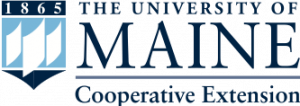
The University of Maine is an EEO/AA employer, and does not discriminate on the grounds of race, color, religion, sex, sexual orientation, transgender status, gender expression, national origin, citizenship status, age, disability, genetic information or veteran’s status in employment, education, and all other programs and activities. The following person has been designated to handle inquiries regarding non-discrimination policies: Sarah E. Harebo, Director of Equal Opportunity, 101 North Stevens Hall, University of Maine, Orono, ME 04469-5754, 207.581.1226, TTY 711 (Maine Relay System).
